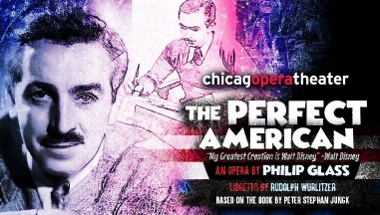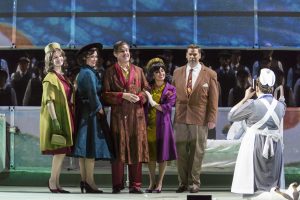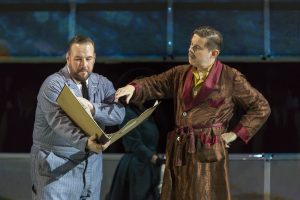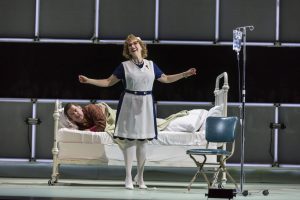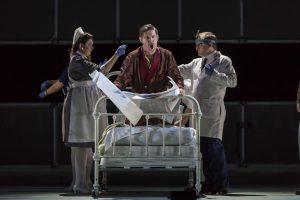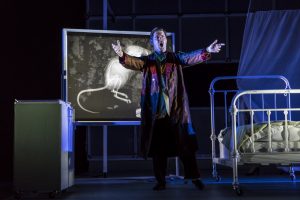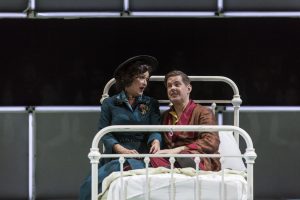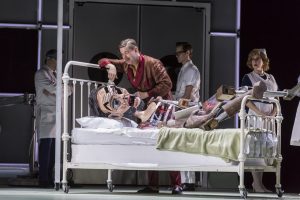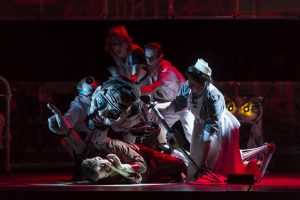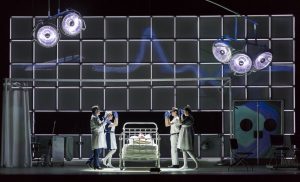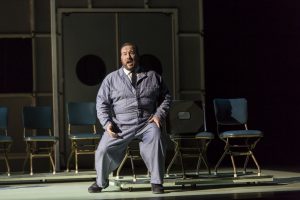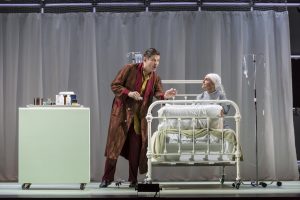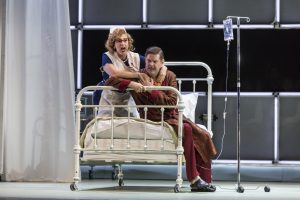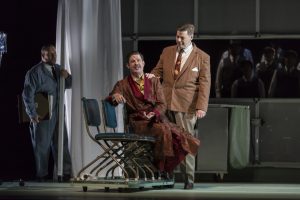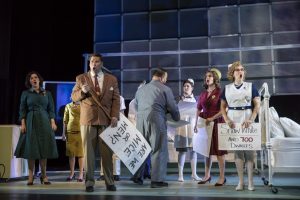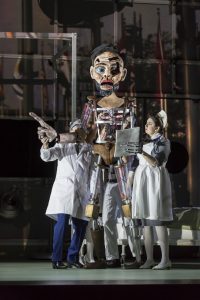PERFECT IMPERFECTIONS
Growing up on a steady diet of animated and live-action Disney films and in the shadow of the Disneyland theme park in Anaheim, which I visited every year until I was 16, the magic and imagination of Walt Disney permeated my childhood, as it did so many others. Disney imagined worlds where anything could happen. Yet, his own life seems to have been less than magical. And as a subject in his own right, he is rather uninspiring, even repulsive. Disney was frequently overbearing, took credit for others’ artistry, and indulged in the kind of conservative politics that propelled Ronald Reagan from the California governor’s mansion to the White House.
Based on the novel of the same name by Peter Stephan Jungk, Philip Glass’s The Perfect American portrays Walt Disney in the last months of his life. Sweeping back and forth in time in keeping with the introspection of a dying man, Rudolph Wurlitzer’s libretto is basically a monologue adorned with walk-on parts. There is no plot, no direction, and no climax. In some ways it mirrors perfectly Glass’s own musical style, which moves steadily and rhythmically, revealing occasional glimmers of subtle beauty, but without much passion or drama. In other words, it feels too abstract and cerebral.
The Perfect American is not one of Glass’s best works, but as opera it still fares better than most of its contemporaries. Most importantly, the minimalist uses minimal amounts of dissonance. He also knows how to write vocal lines that, while not overly melodic, at least rise and fall like ordinary speech and fit within comfortable ranges. And even though he composes for a full chorus, he doesn’t quite know what to do with them. Glass isn’t helped by Wurlitzer’s libretto, which has the chorus singing such lines as “Choo choo” in imitation of Disney’s beloved train.
Chicago Opera Theater’s production is one of the company’s slickest and most professional in recent memory. This impression is no doubt aided by COT’s return to the Harris Theater as well as by Kevin Newbury’s excellent direction. Newbury makes maximum use of Zane Pihlstrom’s period-perfect set and costume designs and the cast’s superb acting skills to create drama in an opera where little is going on. Thus, we see Walt building a fantasy castle in silhouette out of pill bottles and contriving a train out of hospital beds. In keeping with the musical momentum, performers and props are always moving; nothing stands still. There are some odd moments, however, such as Disney’s verbal exchange with a grotesque Abraham Lincoln puppet. Or when we see Kyle Knapp’s Andy Warhol remove his wig and jacket on stage before resuming his principal role as Disney’s doctor.
In general, The Perfect American’s creative team is extremely constrained by the aggressive copyright claims of the Disney company, but no one more so than video and puppet designer Sean Cawelti. Absent from the set is anything that even remotely looks like Mickey Mouse, Sleeping Beauty’s Castle or any other Disney icon.
Two characters stand out among a cast of more than a dozen: baritone Justin Ryan as Walt Disney and tenor Scott Ramsay as Wilhem Dantine. Both sing beautifully and powerfully with excellent tone and diction. Ryan naturally gets the most stage time, since Walt is the main character, and it is a testimony to his skill that we never tire of his performance. Even when we are disgusted by the things he declaims, we remain enamored of his charisma. Ramsay’s Dantine, however, is the character that shakes things up and adds a measure of tension to an otherwise uneventful libretto. An uncredited artist, he confronts Disney about stealing his work and claiming it as his own. Ramsay imbues his character with integrity and strength, when it could easily have descended to sniping and menace.
The Perfect American, then, is a rather ironically titled opera about an imperfect man that is itself imperfect. Above all, it lacks the Disney magic and imagination that has captured audiences worldwide. This Chicago Opera Theater production makes Glass’ opera about as perfect as it can be.
Andreas Mitisek conducts his last production as artistic director of Chicago Opera Theater, although he will likely return on a more ad hoc basis. It will be interesting to see how the company will change in his absence. The recently announced 2017-2018 season will kick off with Gian Carlo Menotti’s The Consul and continue with Kevin Puts’ Elizabeth Cree and a double bill of Gaetano Donizetti’s Il Pigmalione and Rita.
The Perfect American
Chicago Opera Theater
Harris Theater, 205 E. Randolph
ends on April 30, 2017
for tickets, call 312.704.8414
or visit Chicago Opera Theater
for more shows, visit Theatre in Chicago
